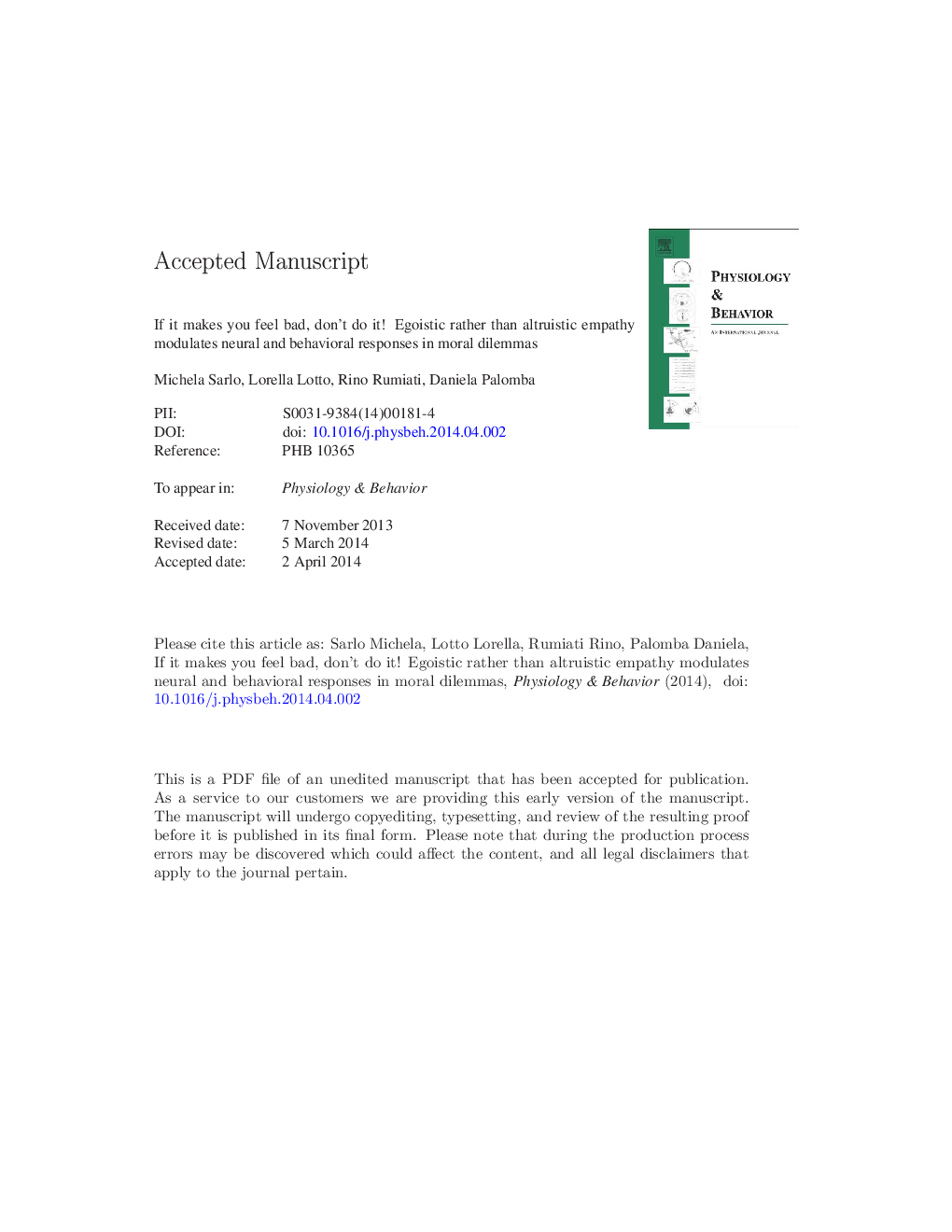| کد مقاله | کد نشریه | سال انتشار | مقاله انگلیسی | نسخه تمام متن |
|---|---|---|---|---|
| 5924221 | 1571187 | 2014 | 37 صفحه PDF | دانلود رایگان |
عنوان انگلیسی مقاله ISI
If it makes you feel bad, don't do it! Egoistic rather than altruistic empathy modulates neural and behavioral responses in moral dilemmas
ترجمه فارسی عنوان
اگر احساس بدی می کنید، این کار را انجام ندهید! همبستگی نسبت به همجنس گرایی و نه همجنسگرایی، پاسخ های عصبی و رفتاری در معضلات اخلاقی را مدون می کند
دانلود مقاله + سفارش ترجمه
دانلود مقاله ISI انگلیسی
رایگان برای ایرانیان
کلمات کلیدی
یکدلی، هیجانی، معضلات اخلاقی، تصمیم سازی، پتانسیل مربوط به رویداد،
موضوعات مرتبط
علوم زیستی و بیوفناوری
بیوشیمی، ژنتیک و زیست شناسی مولکولی
فیزیولوژی
چکیده انگلیسی
According to Greene et al.'s dual-process theory, the differential involvement of emotional processes would explain the different patterns of moral judgments people typically produce when faced with Trolley- and Footbridge-type dilemmas. As a relevant factor, dispositional empathy is known to motivate prosocial behaviors, thus playing a central role in moral judgment and behavior. The present study was aimed at investigating how behavioral and neural correlates of moral decision-making are modulated by the cognitive and affective dimensions of empathy. Thirty-seven participants were presented with 30 Footbridge-type and 30 Trolley-type dilemmas. Participants were required to decide between two options: letting some people die (non-utilitarian) vs. killing one person to save more people (utilitarian). Event-related potentials (ERPs) were recorded stimulus-locked to a “decision slide”. Response choices and ratings of valence and arousal were also collected. Trait empathy was measured through the Interpersonal Reactivity Index (IRI), assessing both the cognitive and affective dimensions. Scores on the Empathic Concern affective subscale of the IRI positively predicted unpleasantness experienced during decision-making for all dilemmas. On the other hand, for Footbridge-type dilemmas only, scores on the Personal Distress affective subscale predicted negatively the mean percentages of utilitarian choices and positively the mean amplitudes of the P260, an ERP component reflecting an immediate emotional reaction during decision-making. It is concluded that “self-oriented” feelings of anxiety and unease, rather than “other-oriented” feelings of concern, affect behavioral choices and emotion-related cortical activity in Footbridge-type moral dilemmas.
ناشر
Database: Elsevier - ScienceDirect (ساینس دایرکت)
Journal: Physiology & Behavior - Volume 130, 10 May 2014, Pages 127-134
Journal: Physiology & Behavior - Volume 130, 10 May 2014, Pages 127-134
نویسندگان
Michela Sarlo, Lorella Lotto, Rino Rumiati, Daniela Palomba,
